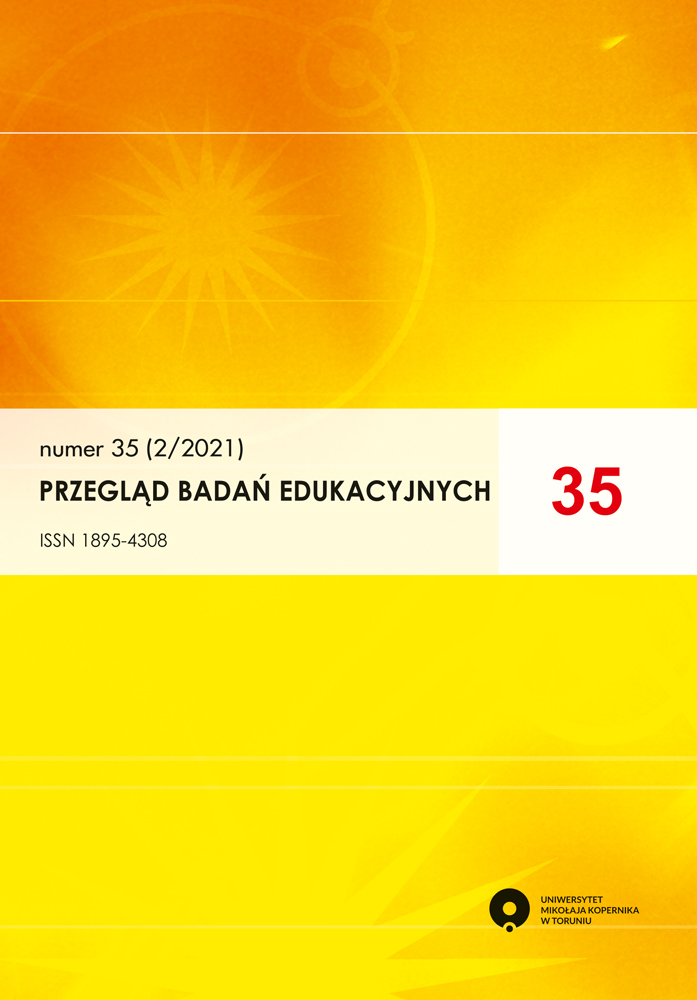Questioning the Phenomenological Foundations of Marton’s Research Approach
DOI:
https://doi.org/10.12775/PBE.2021.045Keywords
phenomenography, phenomenology, philosophical foundations, qualitative research, pedagogyAbstract
The purpose of this article is to try to answer the question: is phenomenographic research underlying (in a broad sense) phenomenological assumptions? It is an important question because opinions on this topic are divided. Some researchers argue that phenomenography derive from philosophical phenomenology. Phenomenology is even treated as a philosophical foundation of phenomenographic research. In this article I argue that the statement on similarities and connections between the two approaches and especially the claim that phenomenography has phenomenological roots are based on mistaken interpretation of the method created by Ference Marton.
References
Berger, P.L., & Luckmann, T. (1966). The Social Construction of Reality A Treatise in the Sociology of Knowledge. Garden City, NY: Doubleday.
Blumer, H. (1986). Symbolic Interactionism: Perspective and Method. Berkeley–Los Angeles: University of California Press.
Buck-Morss, S. (1975). Socio-Economic Bias in Piaget’s Theory and Its Implications for Cross-Culture Studies. In: K.F. Riegel (Ed.), The Development of Dialectical Operations (pp. 35–49). Basel: Karger.
Bruner, J. (2010). Kultura edukacji [The Culture of Education]. Transl. by T. Brzostowska-Tereszkiewicz. Kraków: Universitas.
Galewicz, W. (2002). Edmund Husserl – program filozofii fenomenologicznej [Edmund Husserl – Phenomenological Philosophy Program]. In: Z. Kuderowicz (Ed.), Filozofia XX wieku [20th Century Philosophy]. Warszawa: Wiedza Powszechna.
Gibbs, G., Morgan, A., & Taylor, E. (1982). A Review of the Research of Ference Marion and the Goteborg Group: A Phenomenological Research Perspective on Learning. Higher Education, 11(2), 123–145.
Hasselgren, B., & Beach, D. (1997). Phenomenography — A “Good‐For‐Nothing Brother” of Phenomenology? Outline of an Analysis. Higher Education Research & Development, 16(2), 191–202, doi: 10.1080/0729436970160206.
Husserl, E. (1970). The Crisis of European Science and Transcendental Phenomenology. Transl. by D. Carr. Evanston: Northern University Press.
Husserl, E. (1980). Ideas Pertaining to a Pure Phenomenology and to a Phenomenological Philosophy. Third Book: Phenomenology and the Foundation of the Sciences. Transl. by T.E. Klein, & W.E. Pohl. Series: Husserliana: Edmund Husserl – Collected Works, Vol. 1. Springer Netherlands.
Husserl, E. (2000). Badania logiczne. T. 2. Badania dotyczące fenomenologii i teorii poznania. [Logical Investigations. Vol. 2. Research on Phenomenology and the Theory of Cognition]. Transl. by J. Sidorek, Part. 1. Warszawa: Wydawnictwo Naukowe PWN.
Husserl, E. (2006). The Basic Problems of Phenomenology. From the Lectures. Winter Semester, 1910–1911. Transl. by I. Farin, J.G. Hart. Series: Husserliana: Edmund Husserl – Collected Works, Vol. 12. Dordrecht: Springer.
James, W. (1890). The Principles of Psychology. New York: H. Holt and Company. Judycki, S. (1993). Co to jest fenomenologia? [What is Phenomenology?]. Przegląd Filozoficzny – Nowa Seria, 5(1), 25–38.
Kubinowski, D. (2010). Jakościowe badania pedagogiczne: filozofia – metodyka – ewaluacja [Qualitative Pedagogical Research: Philosophy – Methodology – Evaluation], Lublin: Wydawnictwo Uniwersytetu Marii Curie-Skłodowskiej.
Larsson, J., & Holmström, I. (2007). Phenomenographic or Phenomenological Analysis: Does it Matter? Examples from a Study on Anaesthesiologists’ Work. International Journal of Qualitative Studies on Health and Well-Being, 2(1), 55–64, doi: 10.1080/17482620601068105.
Marton, F., & Booth, S. (1997). Learning and Awareness. Mahwah: Laqwrence Erlbaum Associates.
Marton, F. (1981). Phenomenography – Describing Conceptions of the World Around Us. Instructional Science, 10(2), 177–200, doi: 10.1007/BF00132516.
Marton, F. (1986). Phenomenography – A Research Approach to Investigating Different Understandings of Reality. Journal of Thought, 21(3), 28–49. Retrived 10 June 2020 from: https://www.jstor.org/stable/42589189?seq=1.
Marton, F. (1992). Notes on Ontology (manuscript).
Marton, F., & Neuman, D. (1989). Constructivism and Constitutionalism. Some Implications for Elementary Mathematics Education. Scandinavian Journal of Educational Research, 33(1), 35–46, doi: 10.1080/0031383890330103.
Merleau-Pounty, M. (1962). The Phenomenology of Perception. New Jersey: The Humanities Press.
Morgan, A. (1984). A Report on Qualitative Methodologies in Research in Distance Education. Distance Education, 5(2), 252–267, doi: 10.1080/0158791840050208.
Moustakas, C. (2011). Fenomenologiczne metody badań [Phenomenological Research Methods]. Transl. by S. Zabielski. Bialystok: Trans Humana.
Osteraker, M. (2002). Phenomenography as Research Method in Management Research. Retrieved 29 May 2007 from: http://citeseerx.ist.psu.edu/viewdoc/download?doi=10.1.1.199.5234&rep=rep1&type=pdf.
Pherali, T. (2011). Phenomenography as a Research Strategy: Researching Environmental Conceptions. Saarbrücken: Lambert Academic Publishing.
Prosser, M. (1993). Phenomenography and the Principles and Practices of Learning. Higher Education Research and Development, 12(1), 21–31, doi: 10.1080/0729436930120103.
Säljö, R. (1994). Minding Action. Conceiving of the World Versus Participating in Cultural Practices. Nordisk Pedagogik, 14(2), 71–80. Retrived 15 June 2019 from: https://www.gu.se/english/research/publication?publicationId=87152.
Saussure, F., de. (1961). Kurs językoznawstwa ogólnego [Course in General Linguistics]. Transl. by K. Kasprzyk, Warszawa: PWN.
Schatzmann, L., & Strauss, A. (1966). Social Class and Modes of Communication. In: A.G. Smith (Ed.), Communication and Culture. Readings in the Codes of Human Interaction (pp. 442–455). New York: Holt.
Schütz, A. (1945). On Multiple Realities. Philosophy and Phenomenological Research, 5(4), 533–576, doi: 10.2307/2102818.
Sin, S. (2010). Considerations of Quality in Phenomenographic Research. International Journal of Qualitative Methods, 9(4), 305–319, doi: 10.1177/160940691000900401.
Svennson, L. (1997). Theoretical Foundations of Phenomenography. Higher Education Research & Development, 16(2), 159–171, doi: 10.1080/0729436970160204.
Święcicka, K. (2005). Husserl. Warszawa: Wiedza Powszechna.
Tomassello, M. (2014). A Natural History of Human Thinking. Cambridge, MA: Harvard University Press.
Uljens, M. (1993). The Essence and Existence of Phenomenography. Nordisk Pedagogik, 13(3), 134–147. Retrived 25 February 2018 from: https://www.researchgate.net/publication/285761703_The_essence_and_existence_of_phenomenography.
Uljens, M. (1996). On the Philosophical Foundations of Phenomenography. In: G. Dall’Alba, & B. Hasselgren (Eds.), Reflection of Phenomenography. Toward a Methodology (pp. 103–128). Acta Universitas Gothoburgensis.
Wacquant, L. (2016). A Concise Genealogy and Anatomy of Habitus. The Sociological Review, 64(1), 64–72, doi: 10.1111/1467-954X.12356.
Whorf, B.L. (1981). Język, myśl i rzeczywistość [Language, Thought, and Reality]. Transl. by T. Hołówka. Warszawa: PIW.
Zelic, T. (2008). On the Phenomenology of the Life-World. Synthesis Philosophica, 23(2), 413–426. Retrived 23 June 2020 from: https://hrcak.srce.hr/37220.
Downloads
Published
How to Cite
Issue
Section
License
Copyright (c) 2021 Przegląd Badań Edukacyjnych (Educational Studies Review)

This work is licensed under a Creative Commons Attribution-NoDerivatives 4.0 International License.
Stats
Number of views and downloads: 837
Number of citations: 0



